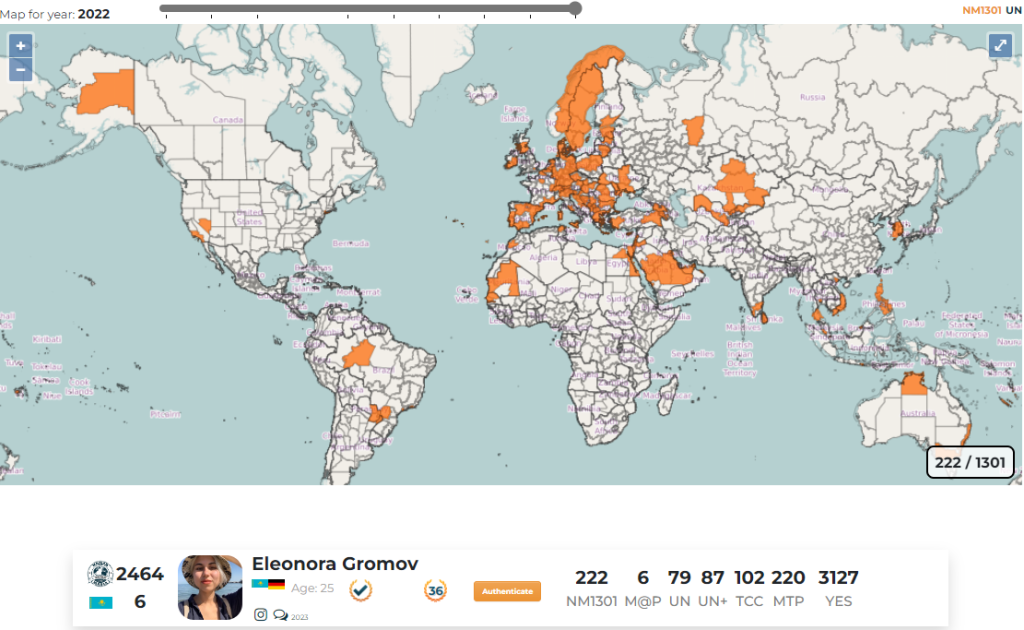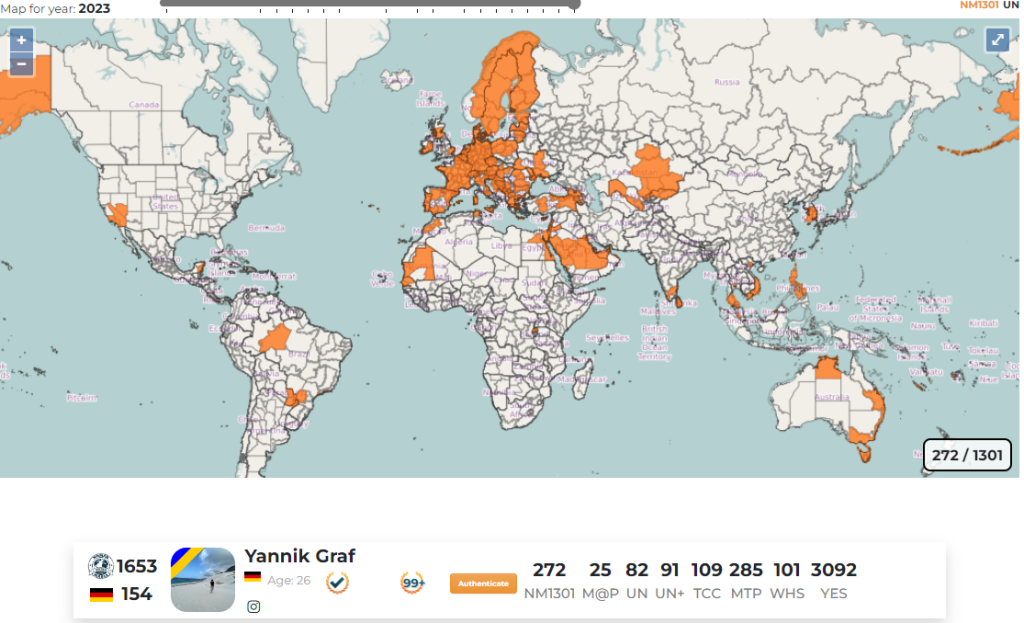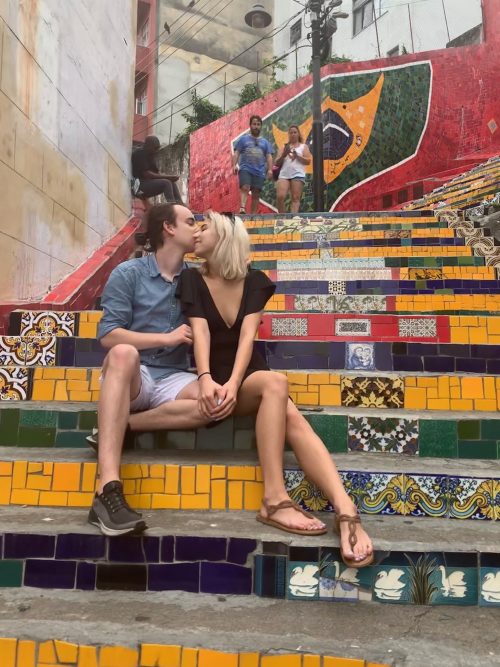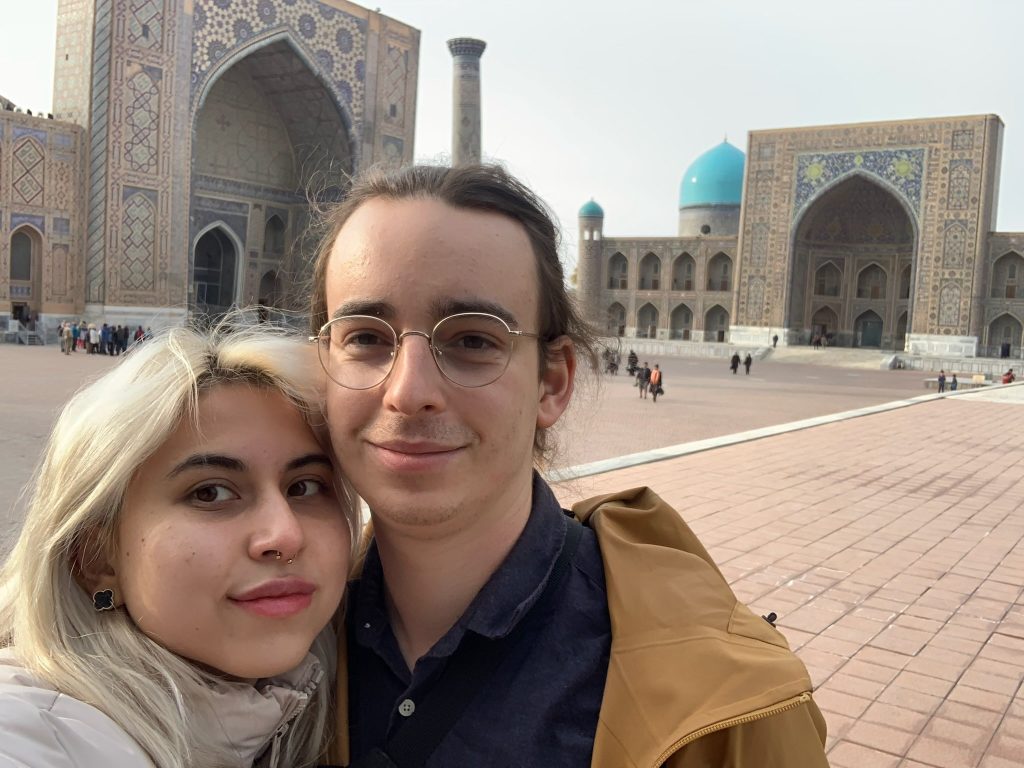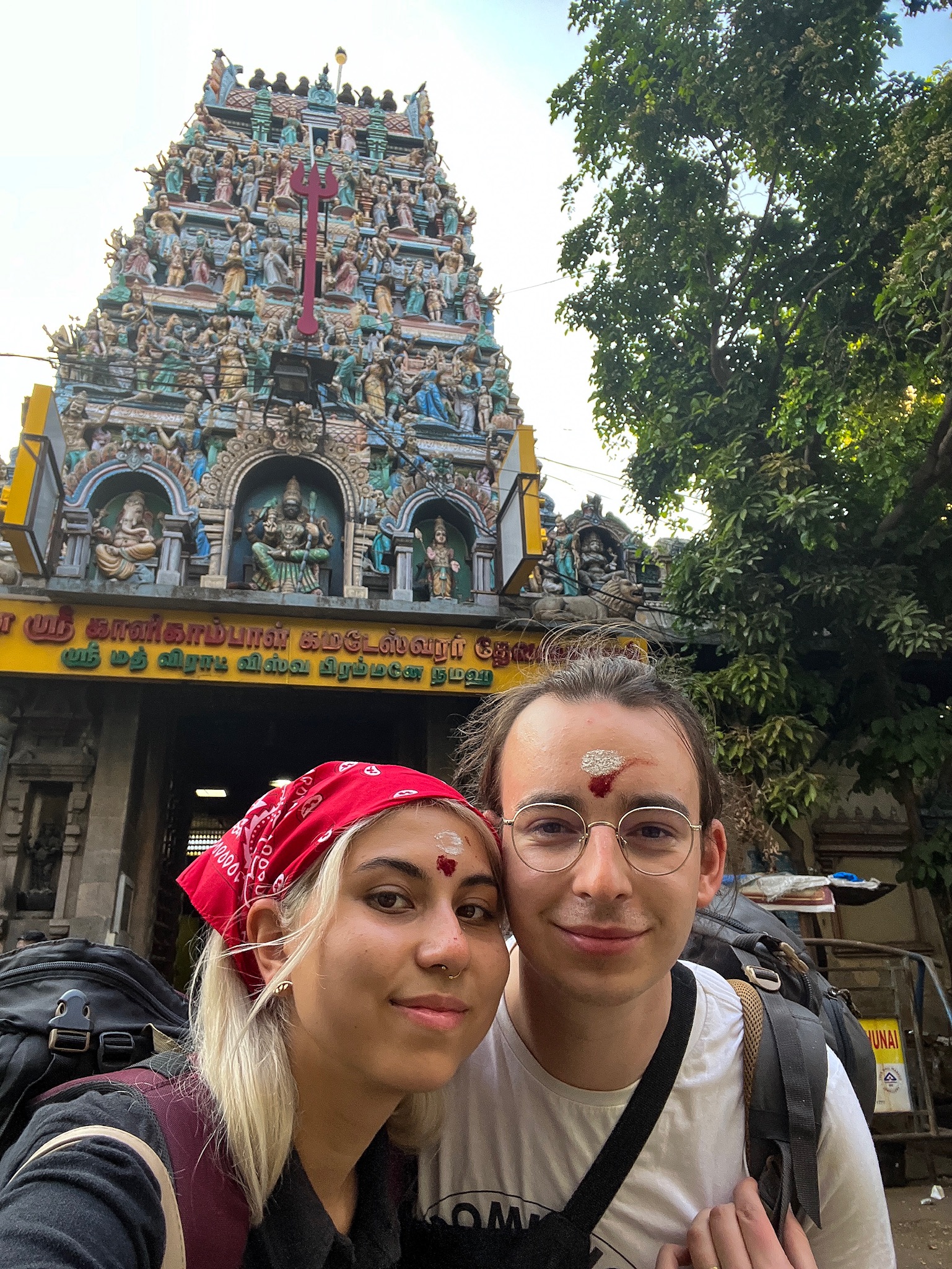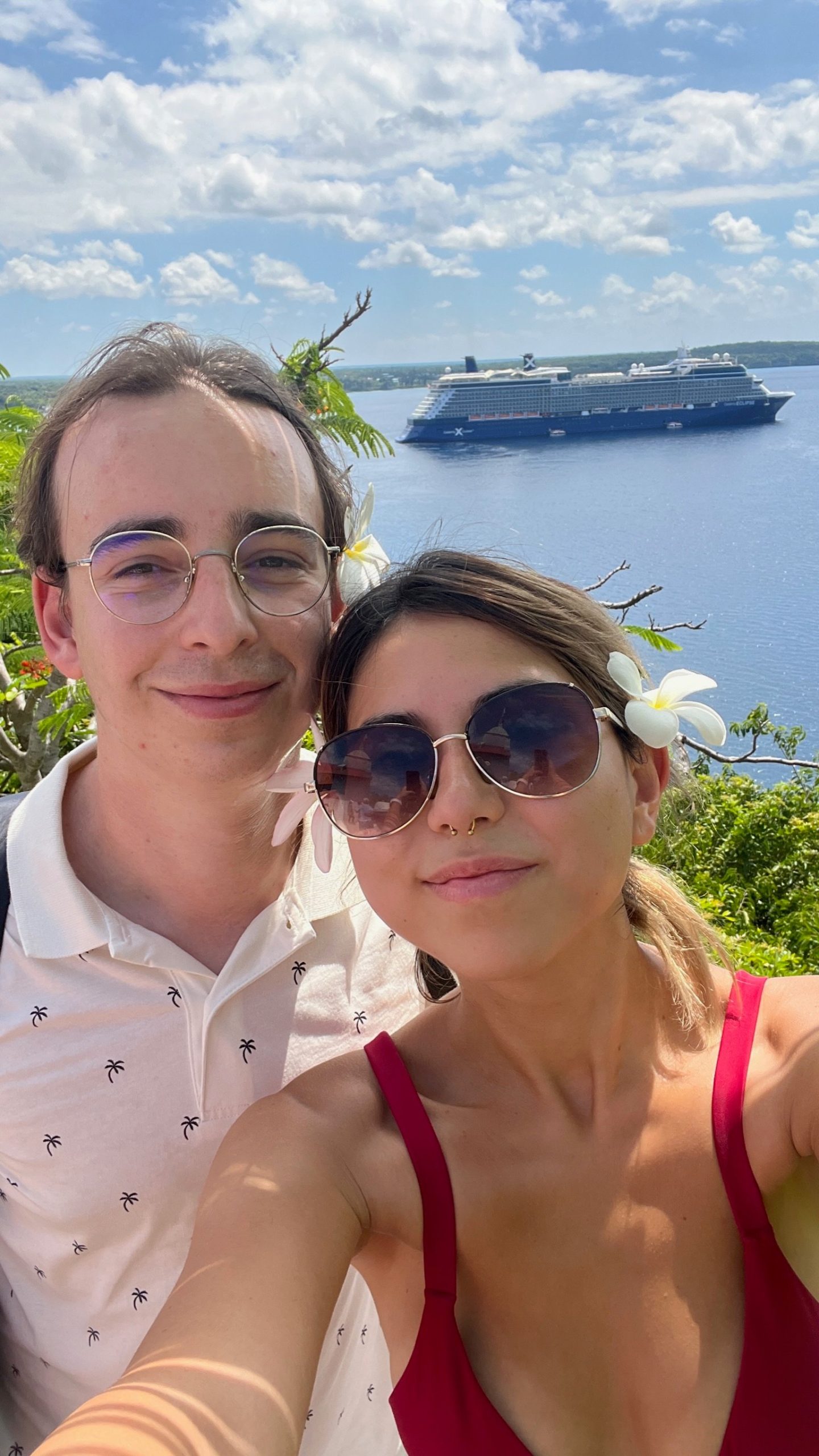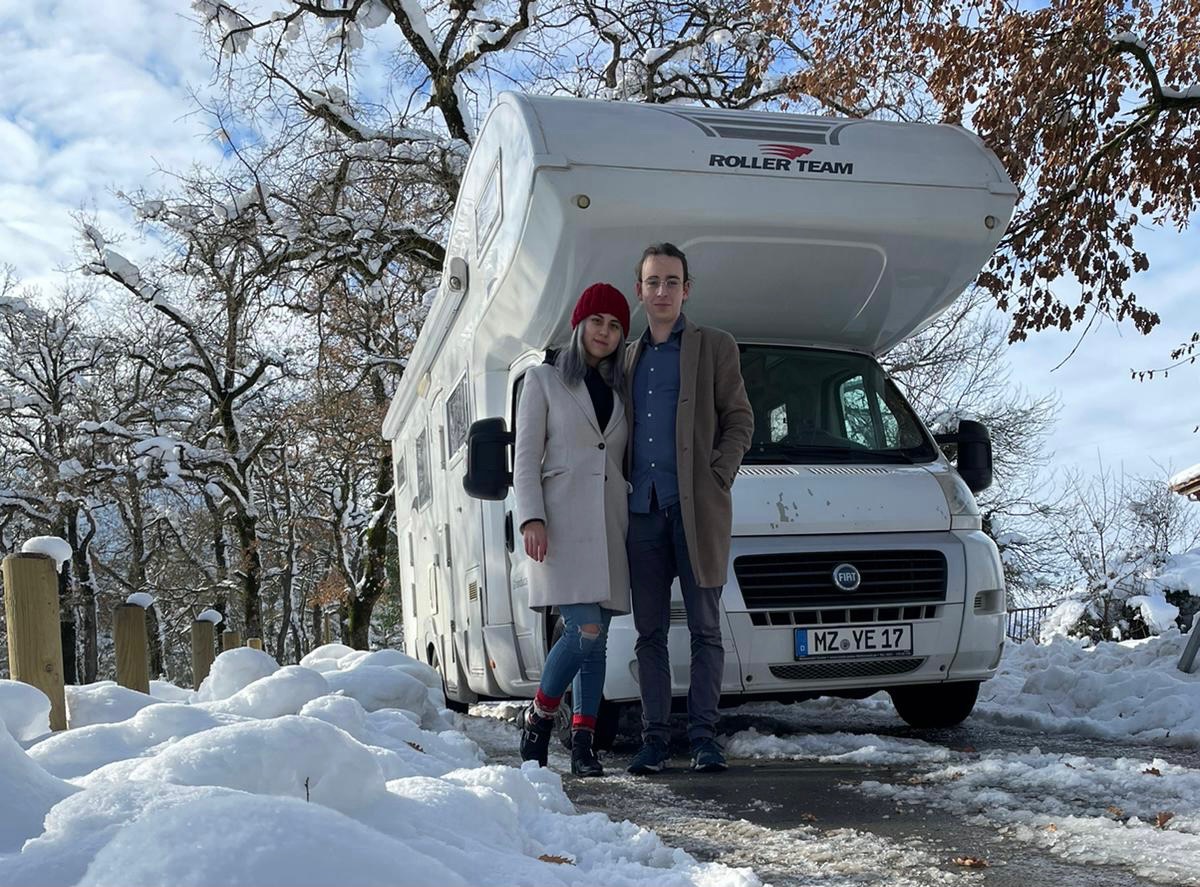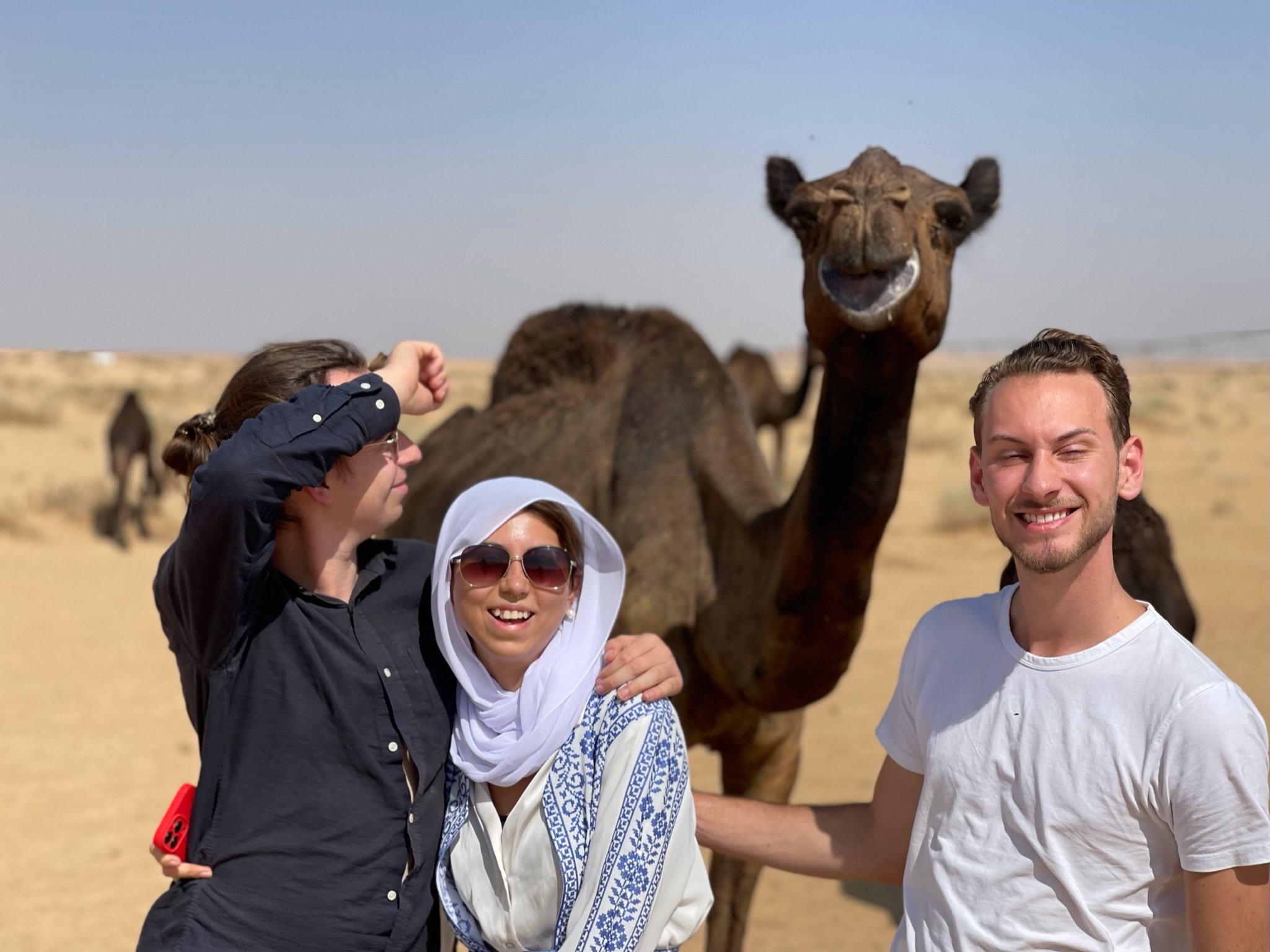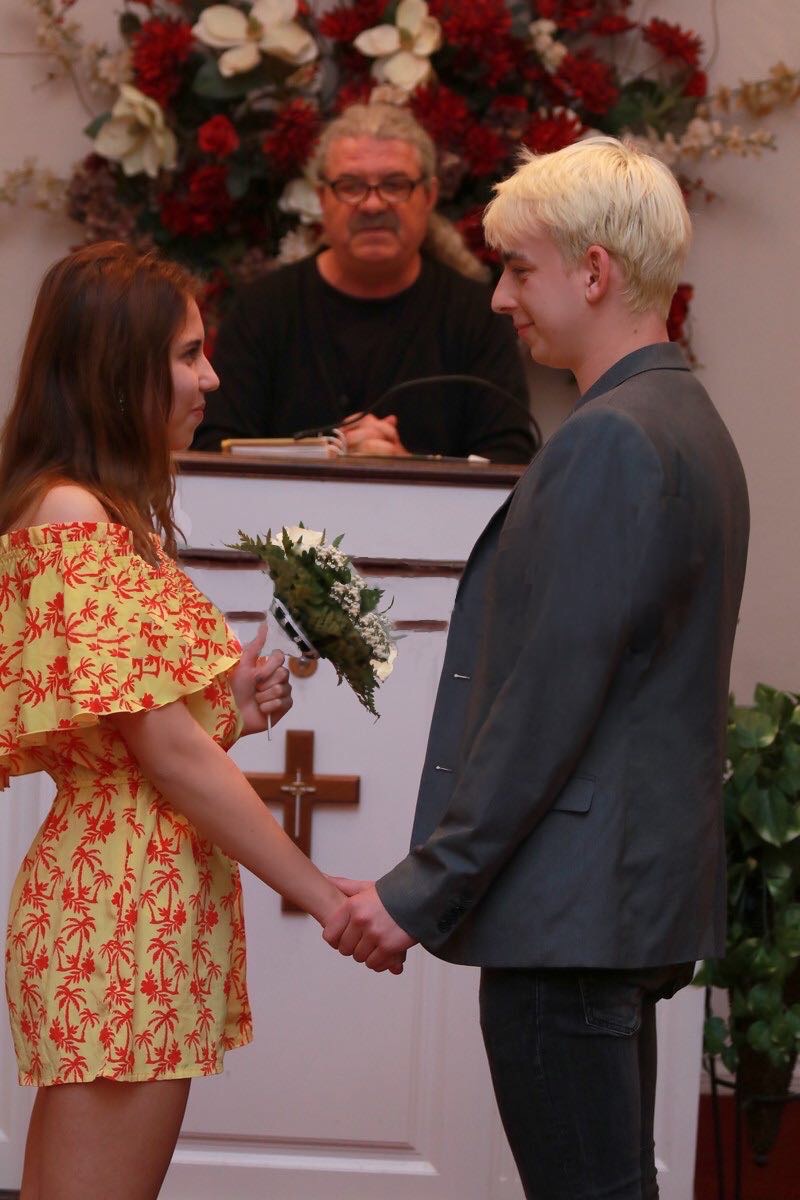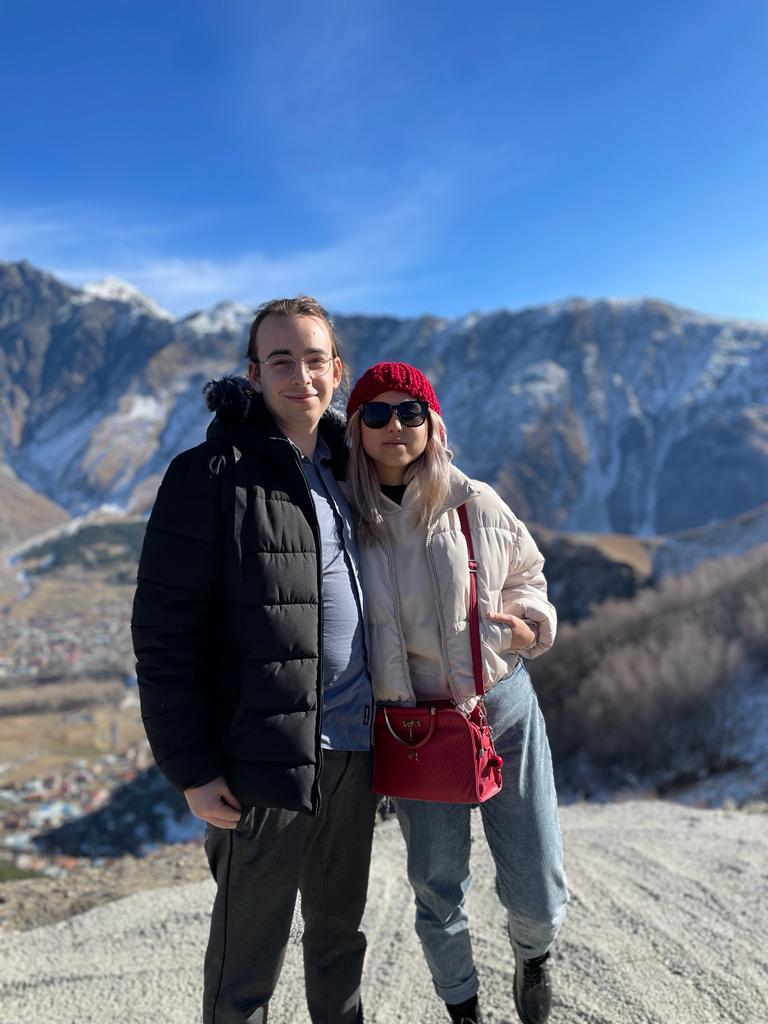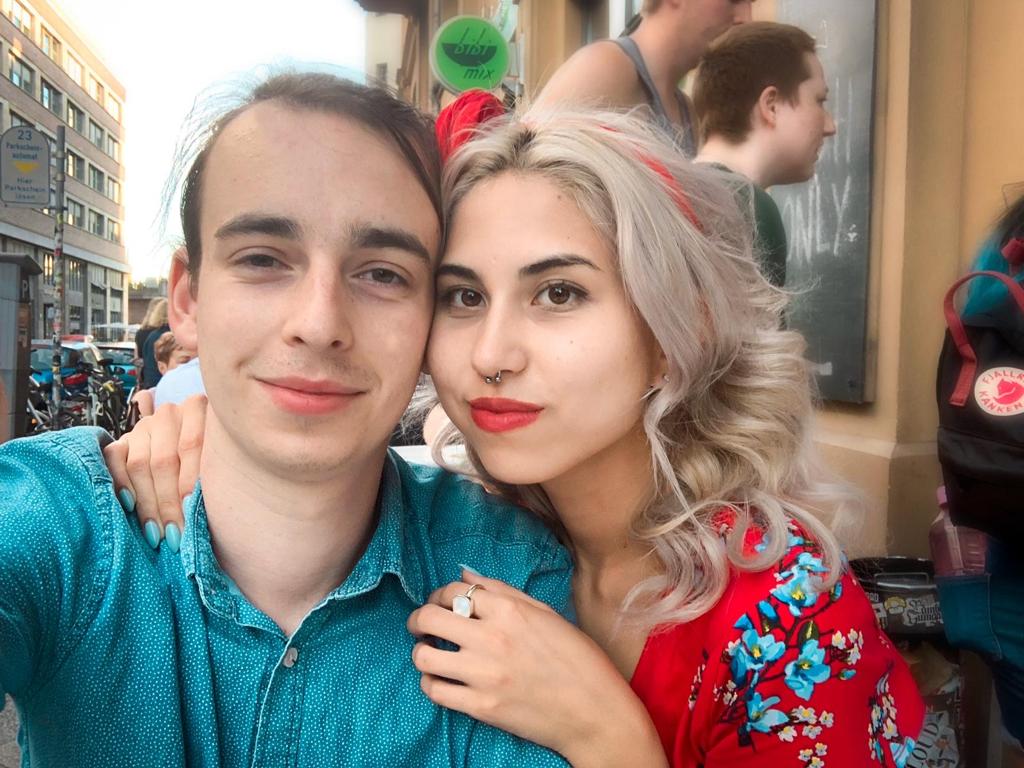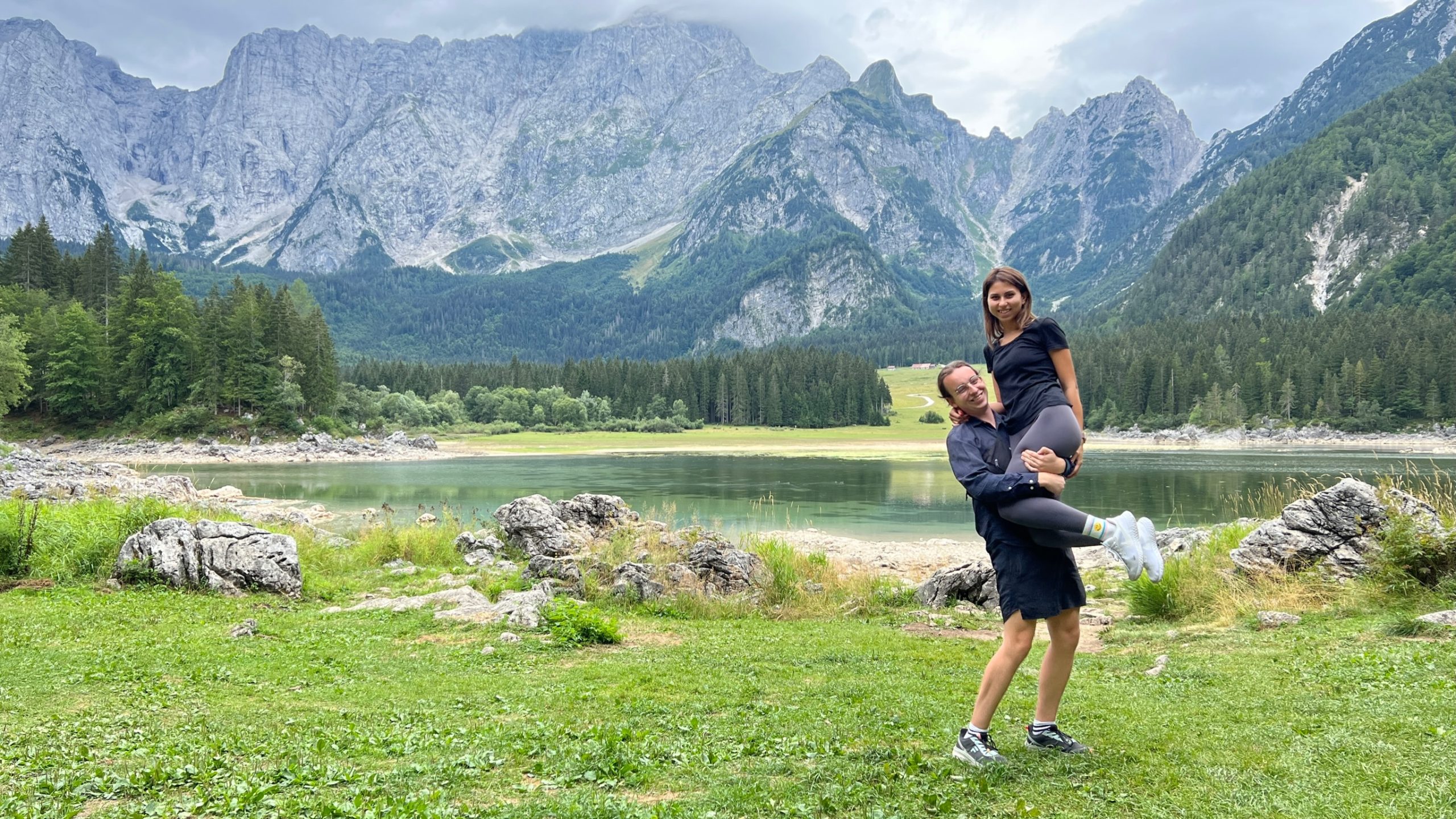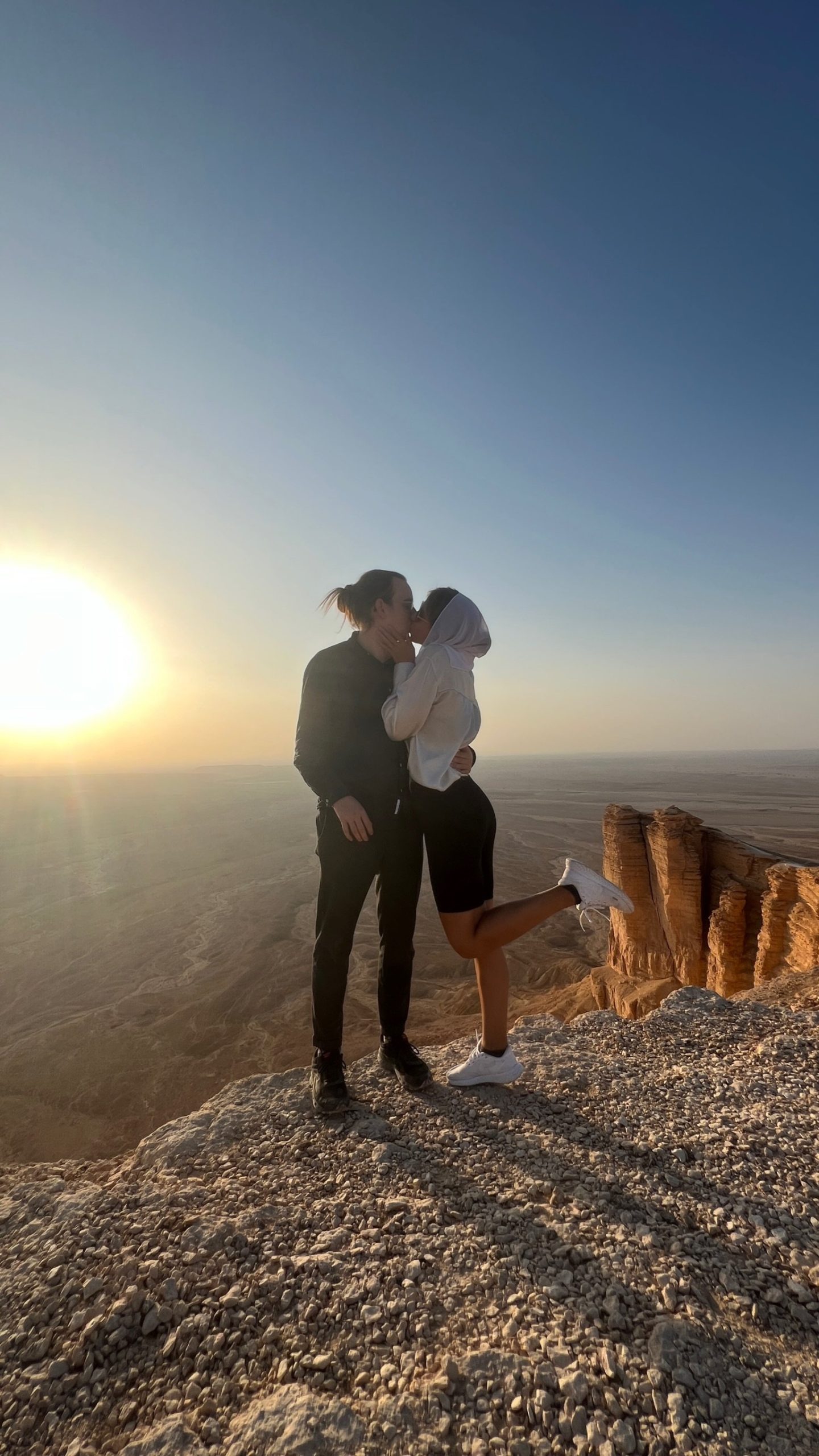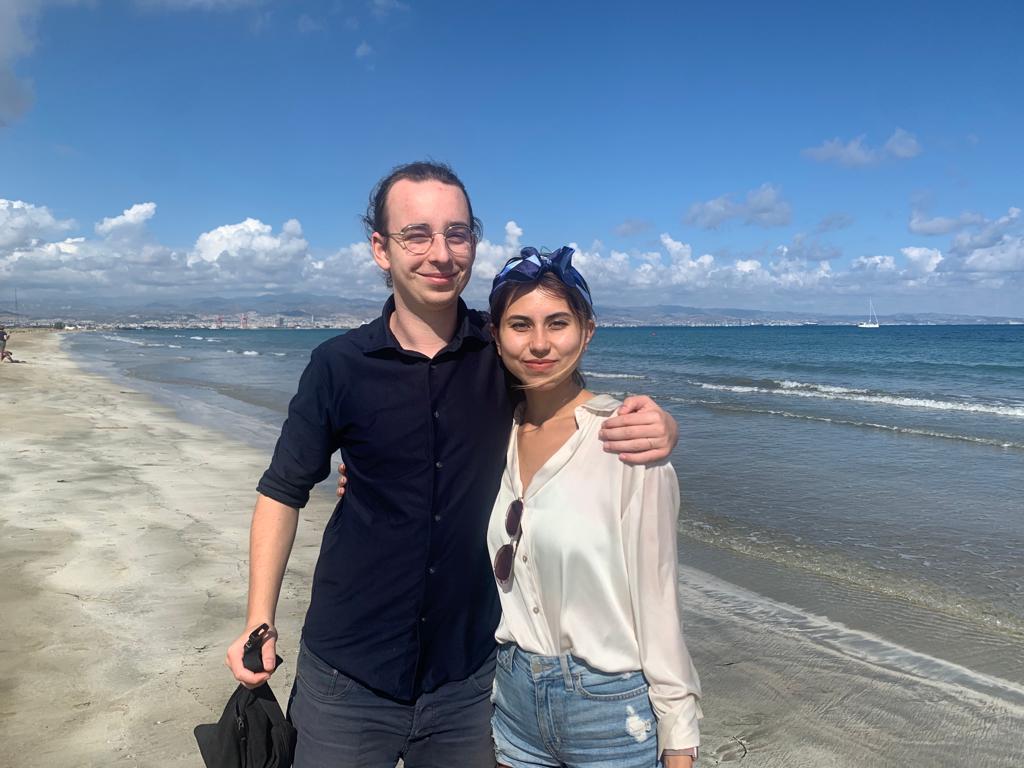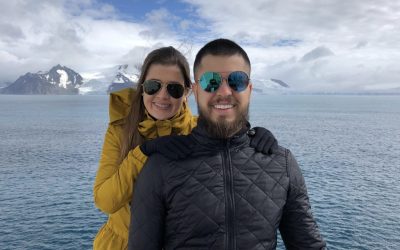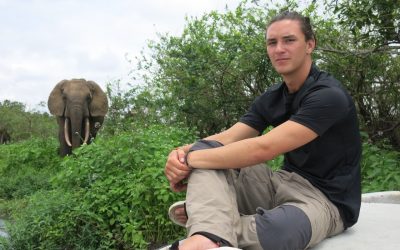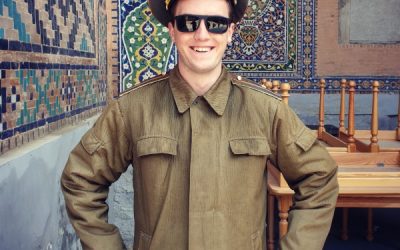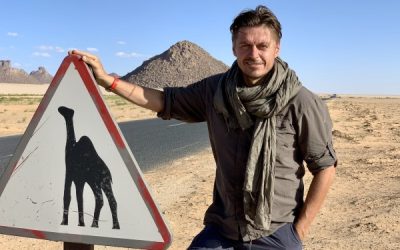Eleonora (Ella) and Yannik are an international young couple who are now full-time travellers. Adherents of slow travel on a budget, they are on the way to visiting half the countries of the world, but given their style of travel they are not in any hurry, rather immersing themselves in a place. They tell us much more in their thought-provoking conversation!
Rio de Janeiro, Brazil
Hey folks, please introduce yourselves and your early lives!
Eleonora: I was born in late 1997 in Almaty, Kazakhstan’s biggest city. During my childhood, Kazakhstan was still stuck in the long-lasting economic depression which plagued all former Soviet states after the Union’s collapse. I barely ever left Almaty, and the first time I travelled abroad was when I was 13 and went on a trip to Turkey with my mother. My life changed radically when I was 15 and my family decided to move to Germany. I didn’t get to see much of the world until then, and travelling the world seemed like an unrealistic dream. But I always tried to find ways to travel. When I was 17, I went to Italy for a few weeks to work as an au-pair.
A few weeks after I got to know Yannik, we got married in Las Vegas and I skipped school for our honeymoon in Alaska. Now last year I found a list that I wrote when I was just 12 years old: 120 places I want to see around the world. I set ambitious goals back then, but now at 25, I have already crossed off many list items.
Yannik: I was born in Mainz, Germany, in 1997 and always had a strong desire for freedom. Unfortunately, my mom has an intense fear of flying, so the only time our family travelled somewhere on a plane was a vacation to Ibiza, which I barely remember. But I always wanted to see the world, and as a teenager, I often ran away from home. I made my first real solo trips when I was 13 and 14; travelling to Strasbourg and Prague by train and riding my bicycle all the way to Paris.
My parents didn’t want to allow me to travel abroad independently, so I had to defy them, which certainly caused some friction. The first time I travelled, they called the police and reported me missing. When I returned from Paris, the police even picked me up at Frankfurt Central Station. But after a while, I was pretty much free to do what I wanted. At 16, I bought my first motorcycle and my first plane ticket. I started living with friends most of the time until I moved into my own apartment at 18.
Samarkand, Uzbekistan
Would you like to give us a few gems of your native countries that people wouldn’t know about?
Yannik: Tourists visiting Germany focus a lot on the Alps, Black Forest, Munich & Berlin – there’s nothing wrong with this because these are fantastic places, but since you asked for hidden gems… I’ve never found a place anywhere on this planet that smells as good as the pine forest next to the village of “Juliusruh”, situated on an Isthmus on the Baltic Sea island of Rügen. During summer, the combination of Pines, the sea breeze and nearby fields of rapeseed blossoms simply makes you want to sit around and do nothing but breathe the air for hours.
There are many underrated regions of east Germany; like Saxon Switzerland with the Elb-Sandstone Mountains (Google Bastei Bridge!), the Ore Mountains and the Spree Forest. In West Germany: our home state of Rhineland-Palatinate, try German wine and see the middle Rhine valley there. Search for literally hidden gems in Idar-Oberstein (Germany’s gemstone capital); visit Saarland, often unfairly described as “Germany’s Alabama” but it’s actually a quirky place with the awe-inspiring UNESCO heritage site “Völklinger Hütte”. You don’t need to be on an extensive German trip to visit Saarland. Just include it in your France itinerary instead, because it’s only a one-hour 40 min train journey from Paris.
Eleonora: I didn’t travel much while living in Kazakhstan because my family didn’t have a car and we were not wealthy enough. Everybody who really wants to see and understand Kazakhstan should skip domestic flights and instead explore the world’s 9th largest country by train! The Kazakh rail network is extensive and (mostly) well-maintained. Tickets are a real bargain.
When you’re in Almaty, you should hike in the Almaty mountains and you may even be lucky enough to see one of the elusive snow leopards. An amusing oddity in the City of Almaty itself is the Beatles statue. Fifteen years ago, the city decided to build statues of the four Beatles for no apparent reason. Almaty has no connection to the band and they never played in Kazakhstan, but at the Beatles Statue, their music is played from speakers all day long.
Yannik and I did an amazing road trip to the Khorgos Free Trade Zone – probably the only place where you can visit China without a visa (even without a passport). On our way there, we stopped at Charyn Canyon, Kaindy Lake (you might have seen photos of the partly submerged trees) and Altyn-Emel National Park. Make sure your rental car is allowed off-road. Ours was GPS tracked, and they weren’t happy to learn that we got our little Lada up to 100km/h in the desert.
Chennai, India
Ella, did you experience culture shock when first coming to Germany? Tell us a little about it.
Of course, I’d never been outside Kazakhstan before except for one visit to Turkey with my mother. It took me a while to understand German culture and learn the language. Because I was 15 when I moved to Germany, the most obvious differences for me were in youth culture. I remember how shocked I was to hear my classmates tell stories about how much vodka they drank last weekend or that they already had intimate relationships. In Kazakhstan, this is neither the norm nor something you would brag about (or at least that’s how it was ten years ago).
Even though religion doesn’t play a significant role in most Kazakh families, girls are still usually raised very conservatively and with many conventions on how “real women” should behave. I had also never seen openly gay or lesbian couples before moving to Germany. I wasn’t raised homophobic at all, but there is no openly existing LGBTQ scene in Kazakhstan, and the topic didn’t ever come up (I just checked, in the most recent poll, only 7% of Kazakhs support same-sex marriage). So seeing my first pride march in Germany was weird for me…today, I’d happily attend one! Now I can only laugh about how I used to see the world, and describing me as “conservative” couldn’t be further from the truth.
Lifou, New Caledonia
You two travelled initially in a camper. Recount some of your adventures that way. Why is a camper a good way to travel?
Your home is always with you! Our experience differs greatly from people who only sometimes travelled in a camper – we lived in it! Our home on wheels was our actual home for two years, with no rent payments for some empty apartment far away. But it also wasn’t one of those small converted Mercedes Sprinters often associated with the “van life”. Our camper had everything we needed. It even had a small garage in the back, which we used to always take a Suzuki GS500 motorcycle with us. This kind of setup gives you unparalleled flexibility. We modified our heating-, electricity- and sanitation systems to keep us autarkic for weeks.
While we lived in Berlin, we parked our home at the banks of the Spree river in Tiergarten between the Bundestag (German Parliament) and Schloss Bellevue. We were basically neighbours to both Merkel and the German president, and we saw them drive past our “bedroom window” in their motorcade more than once. If you want to escape the city’s noise but still be close to it, the camper + motorcycle setup is just a dream. In Barcelona, we parked at the beach of El Prat de Llobregat: 20 meters from the sea and 20 minutes to Barcelonas centre by motorcycle.
Our camper kept us warm even during -10°C nights in the Pyrenees, it kept us safe in even the shadiest parts of some cities, and it enabled us to do incredible motorcycle tours all across Europe without ever having to ride long distances on the motorcycle itself. We are just made for this lifestyle. It also saved us tons of money because we rarely stayed at official campgrounds.
The camper
And what kinds of adventures have you been having since you ‘ditched’ the camper?
It definitely changed our style of travel a lot. In the two years that we called the camper our home, we travelled by air “only” 28 times, which usually meant one of us stayed somewhere with the camper while the other travelled alone or with friends. It’s been 18 months since we sold it and we took 90 flights in that time. Yannik went on a trip to Socotra and learned about NomadMania there. Many of the travellers he met on this trip, including NomadMania founder Harry, are good friends of ours now.
We did an Interrail trip through the Balkans, Switzerland, Hungary, Slovenia, Moldova and Ukraine last year & visited friends in France, Greece and Israel. Besides that, we spent most of the previous two years far away from Europe: Riding a cargo train in Mauritania, sneaking into Artsakh/Nagorno-Karabakh, trying to learn surfing in Sri Lanka, Kava ceremonies in Vanuatu, Exploring the Philippines with a touring motorcycle (and unfortunately crashing it)… swimming with whale sharks, partying with one of Senegal’s wealthiest men (after just walking into his house thinking it was an art museum), Couchsurfing in Lebanon, a 4000km Saudi-Arabia road-trip—too many stories for one newsletter.
We did spend more than a month in Thailand and Sri Lanka, but besides that, our 2022 consisted of a lot of fast-paced travelling. We got to visit almost 50 countries in a single year. We don’t regret it, but we both want to take it a bit slower now. We relocated to Melbourne at the end of last year and are currently only travelling around Australia and its neighbouring countries.
The iconic iron-ore train in Mauritania
You are the ultimate low-budget travellers. Give us some secrets to how you do that.
Don’t pay for a checked bag; you don’t need it. The only time we actually needed checked luggage was when we moved to Israel for a year. Even when we plan for 6-month long trips, we only travel with a carry-on backpack. If the airline says “maximum one piece, 7kg” or something like that, they probably don’t care and won’t check. We have often brought two backpacks each, the larger one weighing up to 15kg, onto the plane and on hundreds of flights, we got charged for excess luggage only exactly one time (thank you Volotea Airlines).
When there is no affordable transportation, hitchhike (and inversely, stop for hitchhikers when you’re driving!).
Use Couch-surfing! We only started using the platform last year for three months, and the people we met and the experiences we’ve had already changed our lives.
Instead of blindly trusting flight-comparison websites, build your own itinerary. It’s a great way to travel long distances while visiting many destinations between your start and end point. When we looked for the smartest way to get from Germany to Australia, we found a route where we got to spend multiple days in Saudi Arabia, Bahrain, Oman, India and Singapore while only spending 265$ on tickets. Subscribe to error fare newsletters. The best deals we have found over the years include 75$ transatlantic return flights, 170$ from Germany to Rio de Janeiro and back, or 1$ flight within Europe.
Generally, just be stubborn enough to always find the real bargains. There is not one colossal life hack that turns full-time travelling into a low-budget undertaking, it’s instead a combination of hundreds of small things you do, and we are still learning every day as we go.
Desert near Ar Pass, Saudi Arabia
What are some of your favourites and least favourites based on your experiences?
Both of us love Israel and the Palestinian Territories. Yes, politics over there are a mess, the governments of both sides are terrible, and many people are unfortunately consumed by this toxic combination of hate and fear, but reducing this part of the world to the conflict does a disservice to all the amazing people living there. We spent about a year travelling to all corners of Israel and the Palestinian Territories and can’t think of another part of the world where there is so much to see in such a small area. During winter you can go skiing in the mountains and float in the dead sea on the same day. You got thousands of years full of history. There aren’t just Jews and Muslims living there.
To find out why there are Circassian villages with Cyrillic street signs in northern Israel, visit the Druze communities in the Golan, learn about why the Baha’i faith bars its adherents from living in Israel even though all of its holiest sites are located there, how the separation wall also separates the worlds last 840 Samaritans. Armenians and Arameans, Assyrians and Copts, Ahmadiyyas, Bedouins, and Arab Christians all create a blend of cultures that can’t be found anywhere else.
The diversity in landscapes matches that of the people! If you like to hike, you get to choose between dense deciduous forests or the thin pine forests of the lower Galilee, deep gorge wadis or desert wadis, rock desert and sand desert, vineyards or orange groves. Visit the Oktoberfest in the Palestinian village of Taybeh. Their “Taybeh Golden” is the best beer we’ve ever tried. The world’s tastiest Snickers shake can be found at “Stars and Bucks” in downtown Ramallah, a place where you get typical Starbucks menu items…plus hearty food, cocktails and Shishas.
A country we both didn’t like AT ALL was the United Arab Emirates. We tried to get a real understanding of this unique place, so we took the time to travel extensively in all 7 Emirates. It was a huge learning experience for sure, and we don’t regret going there at all. We are also huge fans of World Expos and spent a week just exploring the 2021 Dubai World Expo; I’ll admit we loved it! But in so many ways, the UAE are our personal dystopia—16-lane highways between soulless skyscrapers.
Everything is so shallow and superficial, consumption culture and ridiculous luxury created built on the backs of often mistreated immigrants from African and Asian countries. This place then attracts many equally shallow immigrants from wealthier countries. Europeans, Americans etc., who call themselves ex-pats just to never get associated with the term immigrant, which to most of them has a strongly negative connotation.
Besides the rare actual Emiratis, the exploited labourers and the “ex-pats”, there is a fourth category to complete the makeup of people in the UAE – the tourists. Superrich people spend their money on nonsense and shiny stuff, rich people trying to feel like the super-rich, middle-class people from all around the world spending many months’ incomes on designer bags and a week of mediocre entertaining in Dubai just to feel like a rich person for once and to get those precious snaps and Instagram posts. Against all odds, this place was somehow built in the middle of one of the most hostile to-life regions of the world.
Don’t be fooled by the glamour and glittery facades. Just a short drive from Dubai, in Sharjah and Ajman, you’ll find some real rundown neighbourhoods. Flyers and Business cards advertising Asian sex workers litter the streets in many places. Burj Dubai, the world’s tallest building, has dozens of “poop trucks” lined up outside every day to transport human waste away because this “marvel of engineering” doesn’t even have a proper sewage system. Almost everything consumed in this desert has to be imported, and to a large degree, that even includes culture.
Besides, well, consumer culture, much of the cultural goings-on are taken from neighbouring Arab countries or big names like the “Louvre Abu Dhabi”, bought for billions and created by Western curators. In the mid-20th century, the population of what today is the UAE was less than 0.1 million, and the entire population of today’s capital, Abu Dhabi, was roughly 5000. These isolated fishing and pearling communities didn’t have the kind of ancient culture and history of neighbouring countries like Yemen, Oman or Iraq. Now, this suddenly oil-rich hyper-capitalist paradise is governed by a club of ageing, hereditary monarchs, beholden to nobody but their peers.
Albeit geopolitical factors certainly play a more significant role, there is a case to be made that the combination of a cultural inferiority complex and economic boom-induced hubris played a role in the decision to start extensive bombing campaigns in Yemen. With almost no fossil fuels but a rich and ancient culture and history, Yemen is in many ways an Inversion of the UAE. While Emirati fighter jets drop bombs even on UNESCO world heritage sites with no apparent strategic military importance, the local media celebrates the UAE’s first female fighter pilot…hooray for equality.
Almost 100,000 children starved in the almost 10-year-long Yemeni conflict already (total death toll approx. 400,000), but the average tourist you meet on the Dubai Marina most likely won’t know about any of this (they might not even be able to show Yemen on a map). If anyone asks us if they should visit the UAE, I’d say go do it! You’ll learn a lot, this place is unique in so many ways and it presents an exceptional learning opportunity. Venture outside Dubai and Abu Dhabi. Just be prepared for all the dark sides of this place and expect your stay to be expensive. Also, don’t forget to rent a car since you can’t walk anywhere.
Yannik: My other favourites include Armenia and Ireland. Both countries are just made for contemplation and deep thought. The landscape is humbling and just spending time in these parts of the world somehow soothes my soul and makes me have lots of deep breaths. Oh…and I love the contrast of a Pub. It’s the opposite, just party and forget all the deep thoughts again until the sun rises. Saudi hospitality was our biggest surprise of travelling last year. A place that disappointed me was Bali.
Eleonora: Other places I absolutely love are Italy, Lebanon and Vietnam. All these three places combine awesome food with a general atmosphere of chaos and passion. Kuwait and Bahrain are places that I don’t want to visit again anytime soon.
Getting married at the Little white chapel, Las Vegas
What do you like most about NomadMania?
We love the way NomadMania divides the world into over 1000 regions. The regions just make sense, and you can learn something about a country just by looking at how NomadMania divides it. These borders usually truly represent a big difference in history, culture or landscape and biosphere. Within the travel community, we both see the increasing competitiveness in travelling as kind of problematic.
Many who call themselves “extreme-travellers”, “nomads” and such are just hunting for bragging rights, hopping from country to country without actually experiencing; ticking off another item on your list but never trying to learn and understand; taking just a brief look at a culture and it’s people instead of truly trying to immerse yourself. We are close to reaching 100 countries, and we could probably have made it to 130 or maybe even 150 by now without spending more money.
But even with this higher number and the clout that comes with it…both of us would be lesser travellers, with less of an understanding of how the world works. NomadMania also encourages this gamification and, admittedly, the competitiveness – but it does it in a good and healthy way. Every region comes with a guide, divided into categories. This is so useful and unique to the platform! Also, your Map clearly shows you that you haven’t really seen the country of France when you’ve just spent a day in Paris. Don’t waste your time and money collecting countries and passport stamps, collect memories. Visit places a second, third or tenth time!
Kazbegi, Georgia
Ella, you are now a member of the NomadMania Executive Committee. Tell us a bit about your experience there and what specific contributions you hope to make.
I love working with the committee because the different members all bring very different backgrounds and skill sets to the table. Discussions during Zoom meetings with the committee can be intense, and I love that, it shows that everybody isn’t just involved with shaping NomadMania; they are passionately involved! All of us genuinely care about making this platform the best it can be and having a positive impact. The contributions I’d like to make are to be the voice of a young traveller on a tight budget and to improve the App.
Berlin, Germany
So what are your travel plans in the next few months?
Eleonora: Right now, we are in Darwin, the only major city in Australia’s Northern Territory. Within the next few weeks, I’ll try to see some more of Australia. It’s just such a vast country, you could travel just around Australia and its islands for years without getting bored. In April I will visit Taiwan for the first time and enjoy some fabulous food in Vietnam again. Afterwards, I have some responsibilities which unfortunately chain me to Germany for three months.
Our summer plans aren’t set in stone yet, but we do have some ideas. We will go on a vacation in Germany with our family and take part in the NomadMania trip to Bratislava. Besides that, we will probably visit many places in Europe (Wales, Ireland, Iceland, Slovenia, Poland and Italy are our ideas for this summer). Later this year, we want to leave Europe again, probably for North America or the Caribbean.
Yannik: There is still so much more to see in Australia, and I want to make the most of my time here. When Ella leaves in April, it’s going to take some time to get used to being without her. We’ve never been apart for three months. But I’m very excited about exploring some Pacific Island nations alone and with NomadMania founder Harry Mitsidis.
I have flights and ferries booked to Fiji, Tuvalu, Tonga, Samoa, American Samoa and a brief visit to Auckland, New Zealand. Afterwards, I’ll go back to Australia. I’m travelling to Germany in July, and my itinerary takes me to Kuala Lumpur again and Taiwan, but sadly I won’t have any real-time to see the country. My plans for summer match Ella’s. Afterwards, we have reservations for cruises to the Caymans, Bahamas and many Caribbean countries. We may find the time to see New Orleans and finally visit Los Angeles again. I’ve been dreaming for years about renting an Aston Martin and driving it on Mulholland Highway or going back to Las Vegas, where we spontaneously married six years ago. At the end of the year, we hope to be in Germany for Christmas and in Kazakhstan for New Year’s.
Triglav National Park, Slovenia
Do you think there will come a point for you to stop travelling and to settle down?
We can’t know for sure…there might come a time when we feel less like spending 100% of our year travelling, but we can’t imagine losing our passion for travelling, exploring and learning someday. A day at the beach can be awesome, but we aren’t satisfied with just visiting the same comfortable places repeatedly, drinking cocktails and tanning. Maybe our biggest motivation to travel is that we want to learn and understand the world better. When we go somewhere, we watch documentaries and read the entire Wikipedia Article of a country/region/city. Especially Yannik can get lost in the Wikipedia rabbit hole for hours.
You see him open the article for Vanuatu, and three hours later the tabs open are some odd combinations like “Charles Vyner Brooke”, “Pear Slug” and “Toyota Hiace”. Explaining how and why he ended up there would take him a while. But that’s the thing, if you’re travelling because you’re after knowledge and longing for a deeper understanding of basically everything, you’ll never be done. It’s possible to step foot on all UN countries or maybe even all 1301 NomadMania regions, but you will never be done learning.
Edge of the world, Saudi Arabia
Finally our signature question: if you could invite any 4 people to dinner from any period in history who would be on your guest lists (you can have separate lists!)
Eleonora: Since this Interview is getting a bit long, we will do two each. My answer won’t sound very spectacular, but it’s the most honest one I can give. I’d like to spend time with my Kazakh grandparents and really get to know them. I was still young when they died, and I wish I could have asked them questions.
Yannik: I’ve never been asked this question, so here is my very spontaneous answer. Two very different people…No #1 Raoul Wallenberg, a Swedish diplomat who is almost forgotten by history. There might not have existed anyone in history who saved more lives through his direct personal actions, all while taking considerable risks and even feeling guilty for every minute he slept because it was time he could have used to save lives. Hollywood immortalised Oskar Schindler, but Wallenberg’s story ended in a Soviet Gulag, and it isn’t even known where or when he died.
To learn more about him, search for “Raoul Wallenberg, History’s Greatest Hero” in your podcast app. No #2 John Frusciante, in my view the greatest musician to ever walk the earth. His Solo Albums sound simply divine to me, and I’d love to meet the guy and talk to him.
Lady’s Mile Beach, RAF Akrotiri, Cyprus

